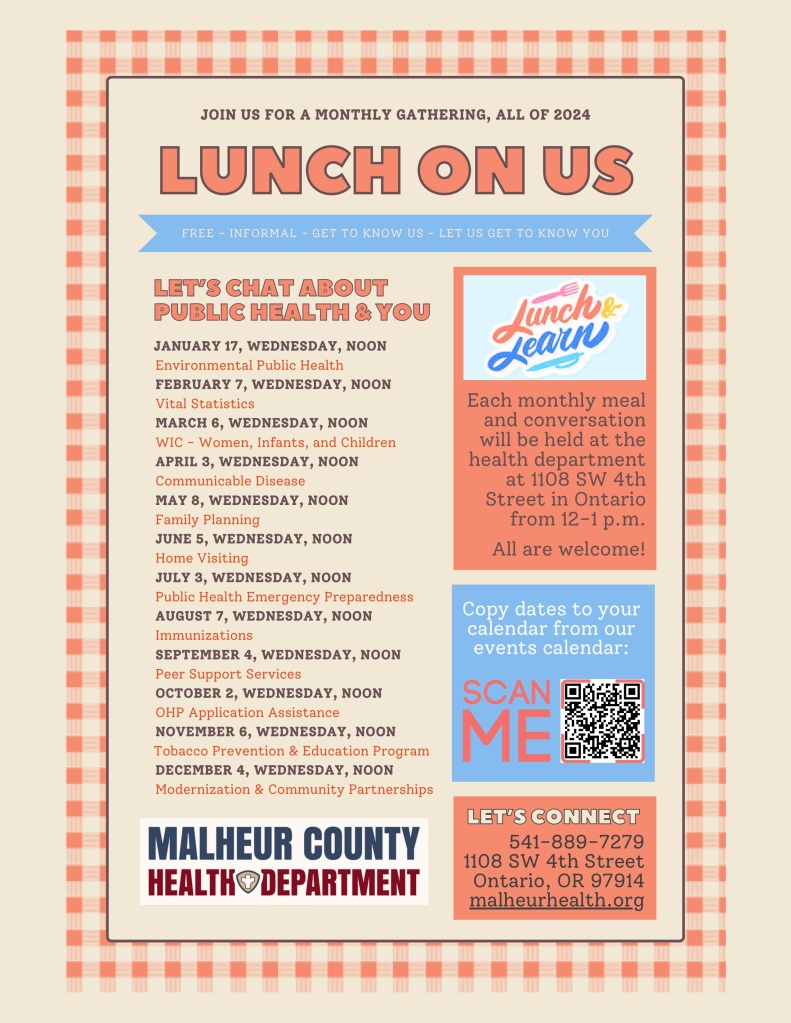June is LGBTQIA+ Pride Month! We want everyone to know: no matter who you are, you are welcome here.
Local Pride Events
This year, there are many events celebrating Pride month in Malheur County and Eastern Oregon. See the One Community All Spirits Stronger Together event flyer here and the EOCIL Pride program here. Follow our Events Calendar and contact us if you would like to add your community event.
Public Health & Pride
Public health supports Pride month and is active in LGBTQIA+ advocacy because creating an inclusive healthcare environment doesn’t just take care of the LGBTQIA+ patient population, it takes care of all of us. We all benefit when the people around us are healthier. (LGBTQIA+ is an abbreviation for lesbian, gay, bisexual, transgender, queer or questioning, intersex, asexual, and more.) People who are LGBTQIA+ have a variety of health needs and often experience health disparities, placing them at risk for negative health outcomes. Health disparities typically result from a lack of access to adequate healthcare. In public health, we care for everyone in our county, especially our most vulnerable.
The Malheur County Health Department (MCHD) provides compassionate, high quality care for all people in Malheur County, including LGBTQIA+ individuals of all ages. We want to address the disparities and improve health outcomes for all.
We are proud to offer many services, including:
- Rapid HIV testing, referral, and connection to treatment
- Sexually Transmitted Infection testing and treatment
- Communicable disease testing and treatment, including tuberculosis and hepatitis
- Wide range of birth control options
- Immunizations, including HPV for all ages 9-26
- Home Visiting programs for children under age 5 and pregnant people
- Pregnancy testing and counseling
- Tobacco prevention and education
- Birth and death certificates, available within 6 months of event
- WIC nutrition program for qualifying children under age 5 and pregnant people
We are a community of all sexual orientations and gender identities and have a variety of health needs. MCHD serves all people regardless of ability to pay, with a few low-cost exceptions. No one will be denied services based on immigration status, sex, gender identity, sexual orientation, race, nationality, or religious affiliation. We also accepts Medicare, Medicaid, and most private health insurance. If you do not have insurance, we have staff who can help you sign up for the Oregon Health Plan or determine your eligibility for other assistance programs.
We provide confidential care at low or no cost for a variety of important services that are available to all in our county. Whether it’s testing for sexually transmitted infections, accessing birth control, or getting WIC services, we are here for you. We have a safe space and are grateful for the chance to serve you.
People who are LGBTQIA+ are members of every community, including ours. They are diverse, come from all walks of life, and include people of all races and ethnicities, all ages, all socioeconomic statuses, and from all parts of the country. The perspectives and needs of LGBTQIA+ people should be routinely considered in public health efforts to improve the overall health of every person and eliminate health disparities.
According to the CDC Youth Risk Behavior Survey, when compared to their heterosexual peers, LGBTQIA+ students are more likely to have been bullied at school, seriously considered suicide, felt sad or hopeless, used illicit drugs, been forced to have sex, and misused prescription opioids.
Find excellent resources for LGBTQIA+ Youth, Educators, and Family LGBTQ+ Youth Resources and more general resources for Lesbian, Gay, Bisexual, and Transgender Health from the CDC. For healthcare providers, the American Academy of Family Physicians provides a highly-recommended LGBTQ Health Toolkit.













